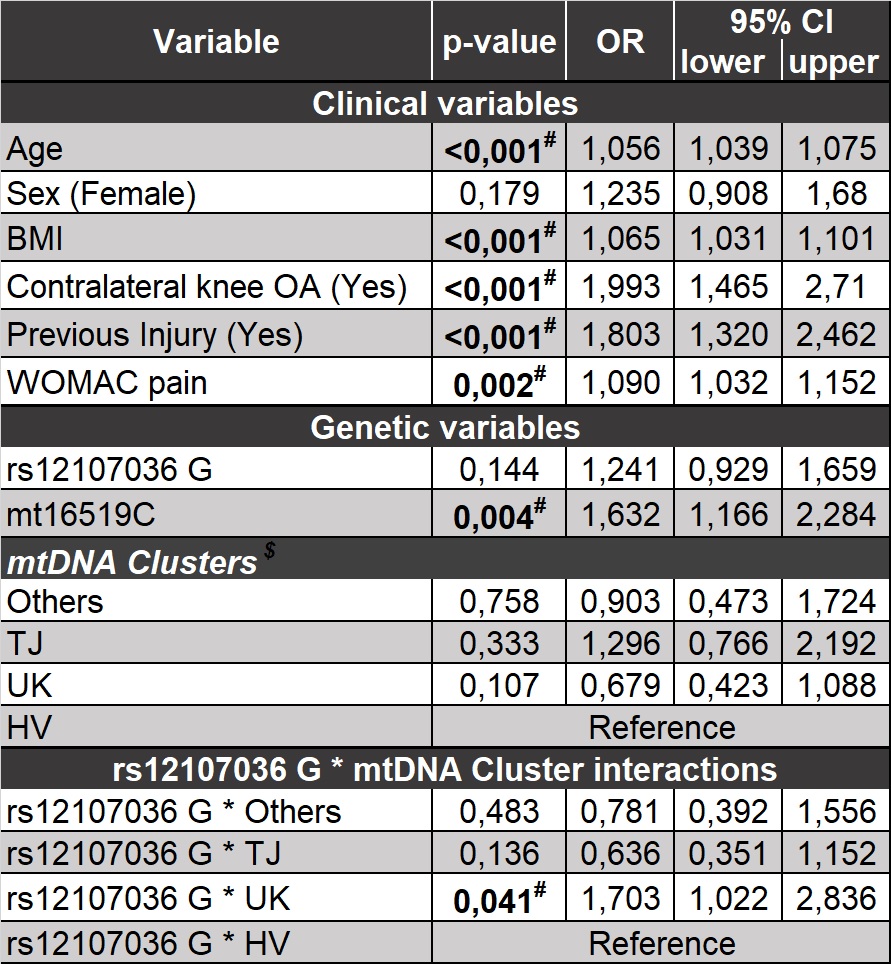Session Information
Session Type: Poster Session B
Session Time: 8:30AM-10:30AM
Background/Purpose: There is a pressing need of identifying patients suffering the rapid progressive phenotype of Osteoarthritis (RPOA) to implement prevention strategies and to include them in clinical trials. Both nuclear and mitochondrial DNA (mtDNA) polymorphisms have been associated with susceptibility and incidence/progression of the disease. Preliminary analyses by our group showed the nuclear single nucleotide polymorphism (nSNP) rs12107036 at TP63 as a potential risk factor for RPOA of the knee.
Our objectives in the present work are:
- To analyze the influence of the interactions between mtDNA haplogroups and the nSNP rs12107036
- To apply Next Generation Sequencing (NGS) techniques to discover novel mitochondrial genetic variants to construct predictive models of RPOA of the knee.
Methods: 1102 Caucasian subjects from the Osteoarthritis Initiative (OAI) were classified into two groups:
- Rapid progressors (N=255), baseline KL grade 0-1 in at least one knee, that increases up to KL≥ 3 during 48-month follow-up; or baseline KL grade 2 in at least one knee that increases up to KL grade 4 during the follow-up.
- Non-rapid progressors (N=847), with the same baseline characteristics as rapid progressors, but with a slower or no evolution over time.
mtDNA haplogroups and rs12107036 were assigned by mini-sequencing techniques. Novel mtDNA variants were analyzed by NGS. Statistical analyses included chi-square tests followed by generalized estimating equations. Relative excess risk due to interaction (RERI) and attributable proportion (AP) was evaluated for the additive interaction between mtDNA clusters and nSNP rs12107036. Confounder variables, including gender, age, BMI, previous injury, contralateral OA and WOMAC pain, were taken into account. All the analyses were performed using SPSS Statistics v24 and epi.R package included in R software v3.6.3.
Results: Chi-square analyses revealed that patients carrying the allele G of rs12107036 and mtDNA cluster UK have an increased risk of developing RPOA of the knee (OR 2,013; p=0,001 vs OR 1,221; p=0,049). An excess of 70,3% of the RERI between nSNP rs12107036 and mtDNA cluster UK was detected, indicating that 47,1% (AP=0,471) of the risk is attributable to this interaction, meaning that harboring both genetic factors increase 4,7 times the risk of RPOA compared to having just one. On the other hand, the in-depth sequencing of mtDNA revealed the mt16519C variant as significantly overrepresented in the rapid-progressors group (OR 1,620; p=0,002).
In the predictive model, the interaction between rs12107036 and mtDNA cluster UK (p=0,041, OR=1,703), as well as the mitochondrial variant 16519C (p=0,004,OR=1,632), showed a significant association with RPOA of the knee, in addition to age (p= < 0,001, OR=1,056), BMI (p= < 0,001, OR=1,065), contralateral OA (p= < 0,001, OR=1,993), previous injury in the target knee (p= < 0,001, OR=1,803) and WOMAC pain (p=0,002, OR=1,090) (Table 1).
Conclusion: Our predictive model indicates that mtDNA genetic variants are useful, not only as modulators of the influence of specific nuclear polymorphisms on the risk of developing RPOA, but also as candidate genetic biomarkers of this phenotype.
$mtDNA Clusters: group of haplogroups with a common phylogenetic origin BMI: Body Mass Index; WOMAC: Western Ontario and McMaster Universities Osteoarthritis Index; OR: Odds Ratio; CI: confidence interval; #: statistical significance declared at P < 0.05, in bold.
To cite this abstract in AMA style:
Durán-Sotuela A, Fernández-Moreno M, Vázquez-Mosquera M, Ramos-Louro P, Dalmao-Fernández A, Relaño S, Suárez-Ulloa V, Balboa-Barreiro V, Oreiro N, Vázquez-García J, Blanco-García F, Rego-Pérez I. Development of a Predictive Tool for the Rapid Progressive Knee Osteoarthritis Phenotype: Data from the Osteoarthritis Initiative [abstract]. Arthritis Rheumatol. 2021; 73 (suppl 9). https://acrabstracts.org/abstract/development-of-a-predictive-tool-for-the-rapid-progressive-knee-osteoarthritis-phenotype-data-from-the-osteoarthritis-initiative/. Accessed .« Back to ACR Convergence 2021
ACR Meeting Abstracts - https://acrabstracts.org/abstract/development-of-a-predictive-tool-for-the-rapid-progressive-knee-osteoarthritis-phenotype-data-from-the-osteoarthritis-initiative/

